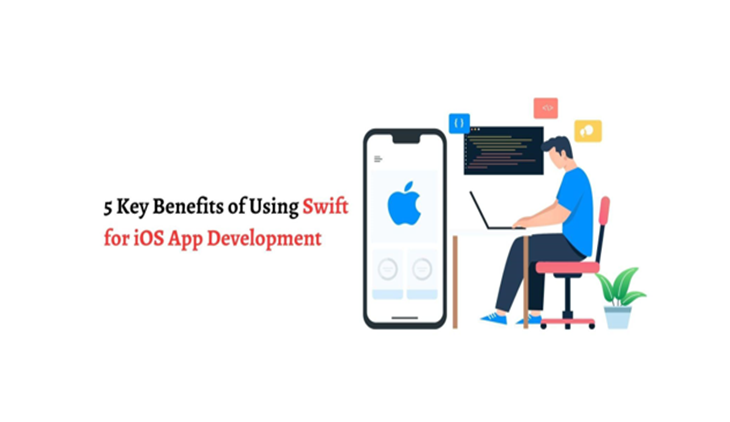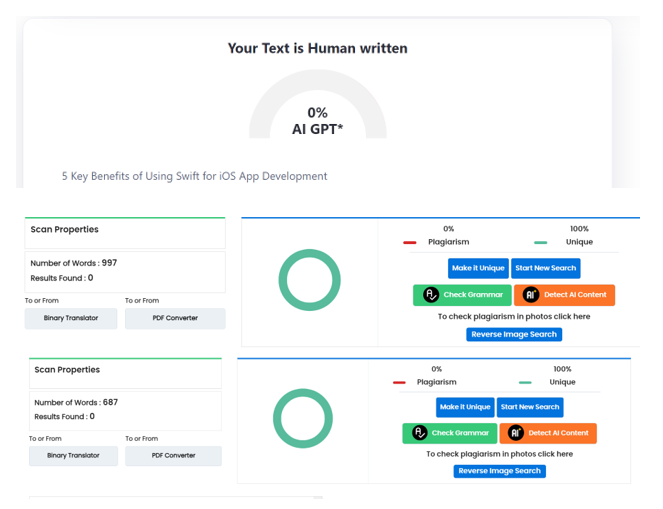
Do you know what makes iOS apps unique, interactive, and secure? Modern technology plays a critical role in designing feature-rich and fully-fledged iOS applications. Swift is one of the well-known programming languages that streamlines and optimizes the development process.
With multiple upgrades and technology advancements, this 2-decade-old language known for safe and modern iOS app development is making strides in the current market. As a result, companies want to hire a reputable iOS app development company to hand over their project and gain a competitive advantage.
This programming language was introduced at Apple’s Worldwide Developers Conference and is specifically for designing intuitive applications for various platforms, such as:
- iOS
- iPadOS
- macOS
- tvOS,
- watchOS
Since Swift works with Cocoa and Cocoa Touch Frameworks and is compatible with Objective-C code for Apple products, many business owners venture into the mobile app space, understanding the advantages of Swift significantly. Whether you are an experienced developer or have an aspiring startup, Swift can impact the success and efficiency of your iOS projects.
What are the Top Features of Swift Programming Language for iOS App Development?
1. Safety First
Swift prioritizes safety with a strong type system and robust error-handling mechanisms. By catching errors at compile-time, Swift helps developers write more stable and secure code, reducing the risk of runtime crashes.
2. Performance Optimization
Swift is optimized for performance, leveraging efficient memory management and a lightweight syntax. This ensures that iOS apps built with Swift are highly responsive and deliver a smooth user experience.
3. Expressive Syntax
Swift features a clean and expressive syntax that reduces boilerplate code and makes programming more intuitive. This improves developer productivity and the readability of the codebase.
4. Interoperability with Objective-C
The interoperability with Objective-C of Swift allows developers to leverage existing codebases and libraries. This flexibility makes adopting Swift incrementally and integrating with legacy systems easier.
5. Growing Ecosystem
Swift benefits from a vibrant ecosystem supported by Apple and the developer community. Access to libraries, frameworks, and comprehensive documentation accelerates iOS app development and fosters innovation.
How Swift Advances iOS App Development Experience? 5 Key Benefits Explained
1. Enhanced Safety and Reliability
Swift enables developers to write safer code and address potential issues at compile time rather than runtime. Hence, it reduces the likelihood of runtime crashes and improves overall app stability. This proactive approach to error prevention helps create high-quality iOS applications that enhance user experience.
Moreover, Swift’s optional types and chaining enhance safety by allowing developers to handle nil values gracefully. This feature eliminates common pitfalls associated with null pointer dereferencing, a prevalent issue in languages like Objective-C. By promoting safer coding practices, Swift allows developers to build robust applications that users and stakeholders appreciate.
2. Improved Performance and Responsiveness
In iOS app development, your focus should be smooth performance, and Swift shines in this aspect. Designed to be highly performant, thanks to its efficient memory management model, Swift has lightweight syntax and an optimized compiler.
Furthermore, automatic reference counting (ARC) simplifies memory management, eliminating the need for manual tasks that can introduce memory leaks and performance bottlenecks. This streamlined approach allows developers to focus on building interactive apps without compromising on performance and user experience.
3. Enhanced Developer Productivity
Since Swift is engineered with developer productivity in mind, it offers a clean and expressive syntax that promotes readability and maintainability. The language’s modern features, such as type inference, closures, and generics, reduce code repetition and make common programming tasks more intuitive.
Apple sandbox environment for experimenting with code in real-time enables rapid prototyping and iterative development. This interactive workflow allows developers to explore ideas and refine implementations efficiently with enhanced creativity.
Additionally, the dynamic tooling ecosystem of Swift enhances the overall development experience, which includes:
- Powerful Xcode IDE
- Integrated debugging tools
These productivity-focused features enable developers to seamlessly build high-quality iOS apps focusing on various aspects, such as:
- Quick iteration
- Effectively collaboration
- Timely manner delivery
4. Seamless Interoperability with Objective-C
Swift offers interoperability with existing Objective-C codebases or dependencies, which is helpful for specific projects. Hence, developers can simultaneously leverage Swift and Objective-C within the same project, allowing for a gradual migration to Swift without disrupting ongoing development efforts.
This interoperability feature extends beyond compatibility, enabling developers to access existing Objective-C features like:
- Frameworks
- Libraries
- APIs
Hence, you can utilize both languages’ strengths, benefiting from their modern features while maintaining compatibility with legacy components.
5. Accelerated Development with a Growing Ecosystem
This language has earned significant traction within the developer community, driving the growth of a vibrant ecosystem of libraries, frameworks, and tools. The commitment of Apple has further accelerated its adoption with increased collaboration among developers worldwide.
The growing ecosystem surrounding Swift offers developers access to a wealth of resources, including community-driven projects, third-party libraries, and comprehensive documentation. This rich ecosystem enables knowledge sharing and best practices, accelerating the development of robust and feature-rich iOS apps.
Also read The Comprehensive Technical Guide to iOS Mobile App Development
How to Use Swift to Develop iOS Applications? Step-by-Step Guide
1. Set Up Development Environment
Xcode is available for free from the Mac App Store, which is Apple’s integrated development environment (IDE). Begin by installing Xcode, including the necessary tools, such as:
- Swift compiler
- Simulator
- Debugging instruments
2. Learn Swift Basics
The next step is to familiarize yourself with the fundamentals of Swift programming with online tutorials, official Swift documentation, and courses. Understand the fundamentals and essential concepts of Swift, including:
- Swift syntax
- Data types
- Control Flow (like loops and conditionals)
- Functions and Options
3. Explore iOS Frameworks
Do you want to build interactive user interfaces that seamlessly interact with device features? Hence, gain proficiency in iOS frameworks like UIKit and SwiftUI for creating traditional iOS interfaces, while SwiftUI offers a modern declarative approach to UI development.
4. Utilize Swift Playgrounds
By taking advantage of Swift Playgrounds, a feature in Xcode, you can experiment with Swift code in a playful and interactive environment. Use playgrounds to test ideas, algorithms, and UI components in real-time. This hands-on experimentation will deepen your understanding of Swift’s capabilities.
5. Build iOS Apps
Now, let’s start developing iOS applications using Swift. Leverage Swift’s features, such as strong typing and closures, to write clean, efficient, and maintainable code.
Conclusion
In conclusion, Swift is a robust tool for creating iOS apps, offering unique benefits, such as:
- Safety
- Performance
- Productivity
- Interoperability
- Ecosystem Support
With these capabilities of Swift, businesses can create compelling iOS applications that delight users and drive business growth. As a result, they want to partner up with a renowned iOS app development company whether they are starting a new iOS project or considering migrating existing apps to Swift.











Pingback: iReaShare iPhone Manager: Reseña Completa y Opinión - Nerdilandia